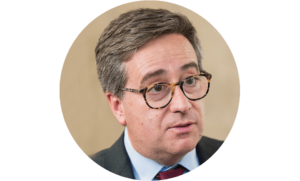David Azevedo Lopes, President AEON Japan
Asking questions has never so important. Also, now more than ever, we need exact, true and scientific answers to the mounting questions. We don’t know in this pandemic when the majority of the world’s population will be vaccinated and the true reach of current vaccines. And we could always ask whether the next strains of this COVID or even a new pandemic, can be tackled with the added advantage of what we have (not) learned with the current pandemic.
We are getting to know and feel the dramatic consequences of this crisis as regards the number of lives lost and destruction of millions of companies and jobs, based on the figures disclosed every day by organisations dealing with statistics, the reduction in the creation of the wealth of nations and reduction of income of workers and households.
We know this, but we don’t know what will be the cost for the new generations of the growing inequalities in many countries resulting in more difficult (or even impossible) access to healthcare and justice at a time when the social lift, which education should enable, stopped and is now mid-floor between the poverty floor and the hope and dream floor. Ironically on a wall in São Paulo, a graffiti sums up this feeling: “In my youth, I was very poor. But after years of struggle and hard work, I stopped being young. ”
The failure to come up with answers to the questions we don’t ask keeps hindering the huge civilizational and scientific advances from being placed fully at the service of the well-being of humanity and individual freedom. A few years ago, the author Naomi Klein (and I must say I don’t agree with most of her theories) wrote in her bestseller “No Logo” that “democracy is a local issue”. Sometimes I think that this little world of ours probably does not allow us to become more accountable as citizens in our countries and the planet. We can mobilise for a local cause, certainly for something serious that has to do with the street we live in, but we are indifferent to the breaches that our awareness and human solidarity should mobilise us against. Social media gave us more power and we became more aware of the fact that there is now more room for defamation, egocentrism and lies, or “neorealism” as some prefer to call it. We thought that digitisation of content, information and knowledge would lead us to a more shared, cooperative world based on access to new opportunities. Instead, we are witnessing the increasing balkanization, fragmentation and control (and sometimes censorship) of these same contents, as predicted in the book “The New Digital Age” published in 2013 by Eric Schmidt and Jared Cohen. This is perhaps why democracy, which we often take as absolute and for granted, is increasingly being put into question.
Everything is apparently in plain sight, but paradoxically, new lines of “politically correctness” in the international dealings are moving us away from the suffering that, for example, the people of Myanmar are experiencing in the face of a military coup which removed a democratically elected government and imposed a martial state that ignores and crushes the population’s constant cries for help addressed to nations like the United States, Japan and the European Union.
How often in the past few weeks have we seen in-depth media coverage of the humanitarian crisis in Yemen, the most serious in the world today. In this country, 80% of the population, including 12 million children, face hunger and extreme poverty daily, with 400,000 children currently at risk of dying from malnutrition.
The Arab spring is a good example of this. It began on the Internet, but the “algorithmisation” of content and our attention diverted us to “free and unpaid” content, that is, refocused out attention rather to news about “two-headed chickens”, “beauty lists and rankings and other achievements ”and some football stories. More than instinctive and superficial answers, that don’t involve science alone, we need to ask the right questions in society, in our companies and in organisations. Contrary to the perception of many, the Internet and access to sharing tools no longer offer citizens a voice. In the future that is already here, more people will have less power. Hence our need to be more demanding as regards those taking up leadership positions. In doing so, we are creating conditions for questions to receive appropriate, rigorous, scientific and truthful answers.
A Navy captain, a friend of mine, defines the accountability we should require from leaders with an image linked to ships, obviously. He asks: “We are on board a large luxury liner. Who do we want to take the helm of the ship? A friend of the shipowner, a friendly person, with good connections and someone who causes a good impression? Or the best among us as regards captaining a ship and navigation techniques? He concludes by answering: “Common sense leads us to choose the second option. Hence so why is it that when it comes to politics and the management of the common good and our predestination, we choose differently?”







